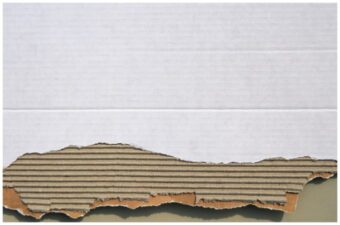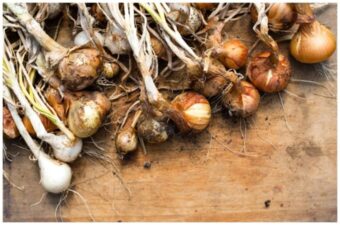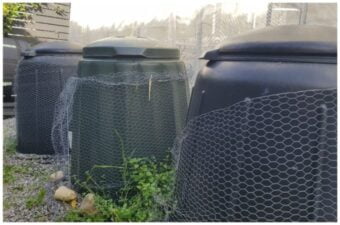The Benefits and Drawbacks of Composting with Wood Chips: What You Need to Know
Composting wood chips can be a great way to recycle and repurpose a common byproduct of tree trimming and landscaping. By turning these chips into nutrient-rich compost, you’re not only reducing waste but also providing a valuable addition to your garden soil.
While the process of composting wood chips can seem daunting, there are several techniques available to help you get started.
In this article, we’ll explore some of the most effective methods and tips to keep in mind on your journey to successful wood chip composting.
If you are just starting out and would like to learn how to create your first compost pile, check out our comprehensive Composting for Beginners guide.

Table of Contents
Can You Compost Wood Chips?
Yes, you can compost wood chips! In fact, wood chips can make an excellent addition to your compost pile, providing more structure and helping to improve the overall quality of your finished compost.
However, it’s essential to keep in mind that composting wood chips may not be as straightforward as composting other common organic materials like leaves, grass clippings, and kitchen scraps.
To compost wood chips effectively, ensure they are small, avoid certain types of wood chips, and add nitrogen-rich green materials to the pile to break them down.
Pros and Cons of Adding Wood Chips to Compost
When considering whether to add wood chips to your compost, it’s important to weigh the pros and cons. Let’s take a closer look at the advantages and disadvantages of utilizing wood chips in your composting process.
Pros
Cons
Understanding the pros and cons will help you make an informed decision about the best approach to creating a healthy, nutrient-rich compost for your garden.
What Kind of Wood Chips Are Best For Composting?
When choosing wood chips for composting, it’s essential to consider the types of wood that break down more easily.
Softwood trees are generally the best option since they decompose faster during the composting process.
Here is a table listing some of the softwood trees that can be used for wood chip compost:
| Pine | Pine trees are a popular source of wood chips for composting due to their abundance and easy availability. They have a high carbon-to-nitrogen ratio, which makes them ideal for composting. You can also compost pine needles. |
| Spruce | Spruce trees are another popular source of wood chips for composting. They have a similar carbon-to-nitrogen ratio as pine trees, and their wood chips break down relatively quickly. |
| Fir | Fir trees are often used for wood chips in landscaping and gardening. They have a high carbon-to-nitrogen ratio and break down relatively quickly, making them a good choice for composting. |
| Cedar | Cedar trees are known for their natural insect-repelling properties, which can be beneficial in composting. Their wood chips have a lower carbon-to-nitrogen ratio than other softwoods, but they still break down relatively quickly. |
However, it’s best to avoid wood chips from certain hardwood trees and those with natural resistance to decay, as they can take much longer to break down in your compost pile. Examples of these include:
| Hardwood Trees | Resistant Trees |
|---|---|
| Oak | Cedar |
| Walnut | Redwood |
| Maple | Cypress |
| Mahogany |
Mixing wood chips from different tree species can also be beneficial for your compost, as it can provide various nutrients and textures. Just remember to keep the proportion of hardwood and resistant wood chips to a minimum to ensure efficient decomposition.
Where to Get Wood Chips
In this section, you’ll learn about various sources to find wood chips for composting:
Wood chipper
If you have access to branches and wooden materials, you can create your own wood chips using a wood chipper. You can rent a wood chipper from a local equipment rental store or purchase one if it’s a tool you’ll use frequently. Make sure to follow safety guidelines when operating the machine to avoid any accidents.
Public Works
Many municipalities and public works departments have wood chip piles available for residents. You can contact your local department to inquire if they have wood chips and if they allow residents to take them for personal use. Some may even deliver them to your property for a small fee or for free.
Arborist Wood Chips
Arborists, or tree surgeons, often have plenty of wood chips as a result of their work. You can contact local arborists and ask them if they have any wood chips to spare. Some might give them away for free or at a low cost, while others may charge a small fee for delivery.
Local Garden Centers
Local garden centers and nurseries often carry wood chips or similar products like mulch. You can visit your nearby garden center and check out their offerings. Keep in mind that while garden centers often have a wide variety of materials available, their prices might be slightly higher compared to other sources.
Craigslist and Other Online Sources
Lastly, websites like Craigslist, Facebook Marketplace, and other online forums can be a great way to find wood chips. People often post ads offering wood chips for free or at a low cost, especially after completing yard work or home improvement projects. Be sure to communicate with the seller about the quality of the wood chips and to arrange for proper transportation if necessary.
Composting Wood Chips
Now that you have your materials, it’s time to start composting!
The Composting Process
Wood chips can be added to your compost pile to increase the carbon content and improve the overall structure of the finished compost. To ensure efficient decomposition, aim to use wood chips that are small in size, preferably 1 to 2 inches (2.5 to 5 cm) at most. Mix the wood chips with other kitchen scraps and yard waste, and aerate the pile regularly by turning it over every few weeks.
The Importance of the N Ratio
In composting, the nitrogen-to-carbon (N:C) ratio is crucial for successful decomposition. Generally, you want to maintain a ratio of 30 parts carbon to 1 part nitrogen. Wood chips are high in carbon, so balance your compost pile by adding nitrogen-rich materials, such as grass clippings or food scraps. This will help maintain the ideal N:C ratio and speeds up the composting process.
Adding Organic Matter to Your Compost Pile
Organic matter is essential to the composting process, and you can add various materials to your pile. Here are a few options:
- Wood mulch
- Wood shavings
- Bark mulch
- Fresh wood chips
- Sawdust
By mixing these materials into your compost pile, you increase the carbon content and improve the overall decomposition process.
Turning Your Compost Pile
Regularly aerating your compost pile is essential for encouraging proper decomposition. Every few weeks, turn over the compost pile to expose all parts to oxygen. This allows for a better breakdown of materials and can help to accelerate the process. As a bonus, frequently turning off your compost pile also helps to prevent unpleasant odors.
How To Compost Wood Chips Faster
Composting wood chips can sometimes take a while, but with a few tips and tricks, you can speed up the process:
Use Smaller Wood Chips
Breaking down larger wood chips into smaller pieces can greatly speed up the composting process. This increases the surface area and allows for better airflow which helps to break down the material more quickly. You can achieve this by using a chipper or shredder.
Let the wood chips decompose first
If you have the time, letting the wood chips start to decompose before adding them to your compost can help speed up the process. Allow them to sit in a pile exposed to the elements for a few weeks before moving them into your compost heap.
Get The Green To Brown Ratio Correct
When composting wood chips, ensure you have the right ratio of green (nitrogen-rich) to brown (carbon-rich) materials. A good rule of thumb is to use a 1:1 ratio, which will help promote decomposition. Green materials include grass clippings, fruit and vegetable scraps, and coffee grounds. Brown materials include wood chips, leaves, and straw.
Adding Nitrogen To Wood Chips (chicken manure)
One way to increase the nitrogen content of your wood chips is by adding chicken manure. This provides additional nitrogen which, when combined with the carbon in the wood chips, helps speed up decomposition. Be sure to thoroughly mix the manure throughout the pile.
Hot Composting Wood Chips
Hot composting is a technique that speeds up the decomposition process by creating a high-temperature environment for microorganisms. Turn the pile regularly to maintain the heat and monitor the temperature, aiming for around 120-160°F (49-71°C).
Keep The Moisture Content Up
Moisture is important for the decomposition process, so ensure your wood chip compost is kept consistently damp. It should feel like a wrung-out sponge, moist but not sopping wet. Adjust the moisture level by adding water or dry material as needed.
Composting Wood Chips With Urea (Urine)
Adding human urine or urea can also speed up the wood chip composting process. The additional nitrogen from the urine or urea aids in breaking down the wood chips. Simply dilute the urine with water and evenly distribute it throughout the pile.
Composting Wood Chips And Cow Manure (Or Other Manures)
Aside from chicken manure, cow or other animal manures can also be added to wood chips as compost accelerators to increase nitrogen content and speed up decomposition. Be sure to mix the manure into the wood chip pile thoroughly for the best results.
How to Use Composted Wood Chips in Your Garden
Congratulations on successfully composting your wood chips! Now that you have a finished product, it’s time to put it to good use in your garden.
Here are some tips on how to use your finished wood chip compost:
- Soil Amendment: Mix your finished compost into your garden soil to improve its quality. Compost is rich in organic matter, which helps to improve soil structure, increase soil fertility, and promote healthy plant growth. Spread a layer of compost on top of your soil and work it in with a garden fork or tiller.
- Mulch: Use your finished compost as a mulch to help retain soil moisture, suppress weeds, and regulate soil temperature. Spread a layer of compost around the base of your plants, making sure to leave a small gap between the compost and the plant stem.
- Raised Beds: If you have raised beds, mix your finished compost into the soil before planting. Raised beds tend to dry out faster than traditional garden beds, so adding compost will help to retain moisture and improve soil fertility.
- Vegetable Garden: Use your finished compost to grow healthy and nutritious vegetables. Compost is a great source of nutrients, which will help your vegetables to grow strong and healthy. Spread a layer of compost over your vegetable garden and work it into the soil before planting.
In conclusion, using your finished wood chip compost is a great way to improve the health and productivity of your garden. Whether you use it as a soil amendment, mulch, or fertilizer, your plants will thank you for it. So go ahead and put your compost to good use, and enjoy the fruits of your labor!
See also How Do I Add Compost to My Garden
FAQ:
Here are some frequently asked questions to guide you through the process.
Are all types of wood chips suitable for composting?
Yes, all types of wood chips can be composted. However, some types, like cedar, cypress, oak, redwood, and American mahogany, take longer to decompose. Remember to mix different-sized chips with other compostable materials for better results.
How long does it take to compost wood chips?
Composting wood chips can take anywhere from a few months to several years, depending on the size of the chips and the composting method used. Hot composting is the fastest method, while colder methods may take longer.
What is the carbon-to-nitrogen ratio for wood chips?
Wood chips are considered a brown, carbon-rich material. A good compost mix should have a carbon-to-nitrogen (C:N) ratio between 25:1 and 30:1. Mix your wood chips with green, nitrogen-rich materials like kitchen scraps and yard waste to maintain a balanced C:N ratio.
Can I add wood chips to an existing compost pile?
Yes, you can add wood chips to an existing compost pile or bin. Simply mix them in with the other materials and remember to maintain a balanced C:N ratio for successful composting.





